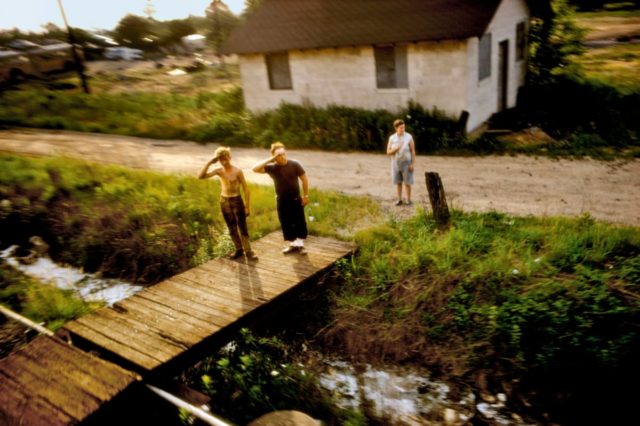RFK Funeral Train, 1968
16.875 x 20.875 x 1.25 in.
Cibachrome print
Gift of John Andrew MacMahon, Class of 1995
Paul Fusco, a world traveler and photojournalist, portrayed a nation in mourning through his critically acclaimed photo-book, RFK Funeral Train. Paul Fusco died July 15, 2020 at the age of 89, at an assisted-living facility in San Anselmo, California.
In the heydays of his photojournalist life, Fusco was a staff photographer for Look magazine, primary competitor of Life magazine during the 1960s. The photo-documentation of RFK Funeral Train came to fruition on a single day in 1968, when Fusco was assigned a last-minute task aboard Robert F. Kennedy’s funeral train from New York to Washington. On commission from Look, he was granted an exclusive access to board the train. Roaming around the corridors, Fusco was greeted by unexpected scenes of people gathering around the tracks. The feeling of loss shared by the people lingered in air accompanied the train – and he began to capture them.
RFK Funeral Train, published thirty years after Fusco had captured those indelible images, first received recognition in 2008. A collection of photographs in color captured in movement, Fusco notes, “I was using low-speed color film, I was on a moving train, I was photographing moving subjects, my shutter speeds were getting lower and lower and yet there were still endless numbers of mourners I was trying to photograph.”
Paul Fusco was born in 1930 and shot pictures for the United States Army Signal Corps in Korea during the early 1950s. He studied photojournalism at Ohio University in Athens, graduating in 1957. He then moved to New York City and became a staff photographer for Look magazine until 1971. From 1973, he had worked at Magnum while also contributing to TIME, Life, New York Times Magazines, among many other publications. His artistic focus remained on documentation of subjects, including workers striking in California and Zapatista revolutionaries in Mexico.
Adrienne Lee ’21

